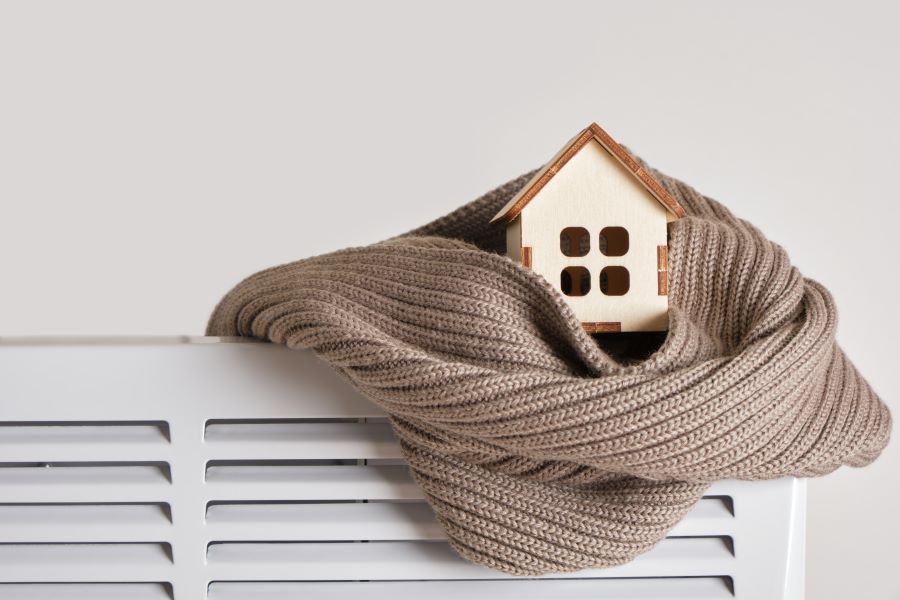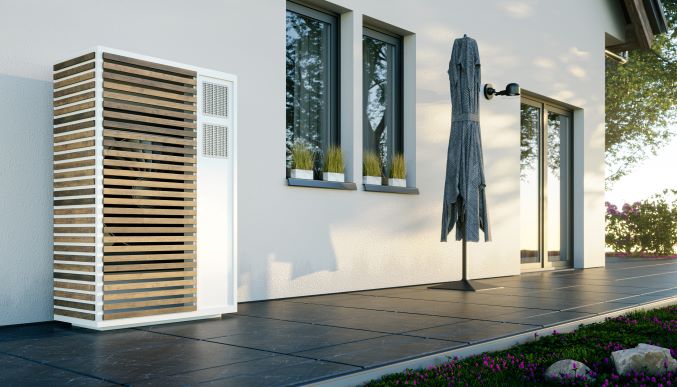Table of Contents
- 1 - Ground Source vs. Air Source Heat Pumps: How to Choose the Right one for Your Property
- 2 - How Do Heat Pumps Work?
- 3 - The Efficiency of Ground Source Heat Pumps vs. Ground Source Heat Pumps
- 4 - Which Heat Pump gets me the Most Money from the Renewable Heat Incentive (RHI)?
- 5 - Upfront Costs of Air Source Heat Pumps vs. Ground Source Heat Pumps
- 6 - Which Heat Pumps Have the Longest Lifespan?
- 7 - Other Considerations
Ground Source vs. Air Source Heat Pumps: How to Choose the Right one for Your Property
Ground source heat pumps and air source heat pumps have become popular choices for homeowners deciding on an energy-efficient cooling and heating system for their home. Knowing which heat pump system to choose for their homes is not often a simple and straight-forward decision for many homeowners.
To help you make a more informed investment decision to heat your home effectively, we outline the key distinctions between these popular forms of heat pumps – ground source heat pumps and air source heat pumps.
How Do Heat Pumps Work?
To put it simply, a heat pump is a technology that uses electricity to move heat from outside air or from the ground and transports the heat to the house. Heat pumps don’t just provide heat, they can be used for space cooling as well. The technology works on the same principle as an air conditioner does. One very important point to understand is that there is no heat generated by heat pumps: it simply moves heat from the source (ground or air) to a destination (your home).
The relatively modest amount of electricity powering the pump makes it possible to move a much larger amount of heat energy into your home. When used for cooling, a heat pump and air conditioner are again mechanically similar, they collect heat from the indoor air and expel it from the exterior unit.
How Does a Ground Source Heat Pump Work?
Sun radiation heats up the earth. The heat is then stored in the earth at a fairly stable temperature of about 10°C, just two meters or so down. To heat buildings and provide hot water, a ground source heat pump system extracts heat from this storehouse of heat that remains constantly available.
A ground source heat pump can raise the temperature of your water to about 50°C, although the hotter you heat your water, the more electricity you’ll be using. This heat can then be used in a boiler for domestic hot water production or in an underfloor heating system.
How Does an Air Source Heat Pump Work?
Air source heat pumps use the principle of heat transfer to heat and, in some cases, refrigerate your house. The system achieves this through a refrigeration process by transferring heat from the outside air into your home during the cold season when you most need the heat.
Low-temperature heat is drawn outside of your home via a heat exchanger and transferred to a refrigerant. The coolant extracts heat from the air and evaporates. The gas then goes through a compressor which raises its temperature. Heat is given off in the process of the refrigerant passing through the condenser. This heat can then be used for underfloor heating, running radiators, hot water heating, and so on.
Which Heat Pumps Work Best in Extreme Cold Climates?
Heat pumps constitute an extremely versatile and efficient source of cooling and heating at home. While heating for your home can be provided by all heat pumps, not all are ideal for extremely cold climates.
Air source heat pumps extract heat from the air outside and push it inside the house. In cold climates, this is made more challenging by the unstable air temperatures outdoors. Conversely, ground source heat pumps utilise the more consistent underground heat energy via pipes placed deeper down than the frost layer below the earth.
When temperatures drop below freezing, air source heat pumps must work harder to pull the small amount of heat available in the air outside. On the other hand, ground source heat pumps extract heat from a much more reliable heat source. As such, in the coldest winters, ground source heat pumps are much more effective when it comes to heating a house, no matter if the outdoor air temperature decreases.
The Efficiency of Ground Source Heat Pumps vs. Ground Source Heat Pumps
What makes heat pumps outstanding is actually their efficiency. Compared to conventional heating systems, heat pumps use significantly less energy to deliver heat to the home. Now when it comes to efficiency between air source heat pumps and ground source heat pumps, ground source heat pumps are more efficient.
The efficiency of air source heat pumps is typically about 300%. This means that for every 100 kW of electricity the system uses, it produces thermal energy of about 300 kW. Ground source heat pumps, on the other hand, can achieve efficiencies of up to 600%.
When you factor that into your electricity bills, it means if you are using an air source heat pump, you will pay more than if you were using a ground source heat pump to heat and cool the same space.
Which will Save me the Most Energy?
Ground source heat pumps will save you the most energy because it runs at COP (Coefficient of Performance) of 4.3 while air source heat pumps operate at 3.2 COP. If you use a ground source heat pump only for space heating, you can save as much as 52% energy.
To make sure you select a system that can run efficiently in your area and save you the most energy, it’s important to factor in the climate where you will be using the heat pump. Ultimately, heat pumps can save you a lot of money on utilities if you install the right type of pump for your region.
How Much can I Save on Bills?
It is difficult to predict the time it takes to recoup your heat pump system’s initial cost in terms of energy savings. This is because it depends on the following factors:
- How efficiently your system works
- The type of system you are replacing
- Whether you qualify for Renewable Heat Incentive earnings
- How well your home is insulated
- How efficiently you use the controls of the system
- How the heat generated from the pump will be utilised
The Energy Saving Trust estimates that for an average performing ground source heat pump, you could save the following per year depending on which system you are replacing:
- Old (G-rated) gas boiler: £505 – £580
- Old (G-rated) oil boiler: £560 – £665
- Old electric storage heaters: £900 – £1,110
- Old (G-rated) LPG boiler: £1,245 – £1,470
How much can you save with an air source heat pump? It depends on what devices you already have at home, how large your home is, and the profile of your energy consumption.
The Energy Saving Trust shows the following potential annual savings for air source heat pumps:
- Old (G-rated) gas boiler: £560 – £650
- Old (G-rated) oil boiler: £930 – £1,100
- Old electric storage heaters: £1,065 – £1,315
- Old (G-rated) LPG boiler: £1,365 – £1610
Which Heat Pump gets me the Most Money from the Renewable Heat Incentive (RHI)?
With a ground source heat pump installation, you will likely be claiming higher incentive benefits if you compare the two technologies. The average ground source heat pump will be eligible for RHI benefits of between £2,405 and £2,830 per annum for a well-insulated 4-bedroom detached house, based on the current programme.
Annual RHI premiums range from £1,341 and £1,586 for a typical air source heat pump in an average-sized, four-bedroom detached home.
Upfront Costs of Air Source Heat Pumps vs. Ground Source Heat Pumps
While the two technologies work based on the same principle, the cost of having them installed is not.
Installation Costs
The installation of air source heat pump is significantly cheaper than that of ground source heat pumps. The installation of ground source heat pump systems requires some digging and additional components which are not needed in air source heat pump systems.
An air source heat pump (without including underfloor heating) costs about £7,500, while a ground source heat pump costs £23,000 with much of the excess expense going on to the borehole that has to be dug – this may be as much as £9,000 for a few deep holes in your backyard.
Planning Permission for Ground Source Heat Pumps vs. Air Source Heat Pumps
Installing a ground source heat pump or an air source heat pump on domestic premises is generally a permitted construction, you don’t have to apply for planning permission. However, we also recommend consulting with your local planning office to determine if there are any extra local criteria.
You must also ensure that the technician installing the heat pump system speaks to the local authority and obtains clearance as to the size and type of unit being installed. Not all systems actually meet the criteria for permitted development.
Which Heat Pumps Have the Lowest Maintenance Costs?
Assuming that the ground array has been properly installed and tested without any water leaks, ground source heat pumps are like your fridge, because the unit itself does not really need any planned maintenance.
The array should include antifreeze and a biocide to stop any growth of bacteria in the water. These chemicals have an anticipated lifespan of more than 10 years so after this period particular attention should be given to water testing, especially if a leak was detected.
An air source heat pump is similarly reliable and requires only periodic checks to ensure that the coil surfaces and the external airway is free of debris.
Which Heat Pumps Have the Longest Lifespan?
Ground source heat pumps should outlast an air source heat pump as there is a better operating environment for a ground source heat pump. Ground source heat pump units are installed under the ground; thus, they are protected against the elements.
However, an air source heat pump is built for the exterior environment, using sealed connections and designed to operate in more extreme conditions than a geothermal unit.
The indoor units of a ground source heat pump usually last from 12 to 25 years while its underground components should last for over 50 years. The lifespan of air source heat pumps is 15+ years.
Other Considerations
Space Required for Ground Source Heat Pumps vs. Air Source Heat Pumps
In your choice between air source and ground source heat pumps, the amount of space available outside of your home will likely play a role. A ground source heat pump comes with outdoor and indoor components. As such, a ground source heat pump needs more outside space than an air source heat pump. That is one reason why air source heat pumps are the most common type of heat pump in the UK.
If your home or business lacks the space for either of these, an air source heat pump, which has lower space requirements, may be better for you.
Noise Level
Since heat pumps come in all shapes and sizes, they make different sounds and the noise levels vary between models and manufacturers. Fortunately, most new air source heat pumps can operate much more quietly than older ones, thanks to government regulations.
A ground source heat pump can reach 42 decibels while an air source heat pump can achieve 40 to 60 decibels but this depends on the supplier and deployment. At the installation stage of the heat pump system, noise output is measured to prevent upsetting your neighbours. The outdoor unit should be as far away as possible from the neighbouring house, and it is also a safe idea not to put the box under any walls.
Summary: Ground Source vs. Air Source
Given the aforementioned considerations, ground source heat pumps are the best option for property owners who can afford them. For those a bit stuck for cash and energy, the more cost-effective alternative is the air source heat pump. If it’s because of space or financial limitations, the solution for some homeowners will be easy, while it will take longer and need more careful analysis of the cooling and heating needs for others.
Either way, the great news is that you’re going to contribute your bit to keep the environment clean and safe and, in the long term, you will be getting back the money you invested from the government as long as the RHI scheme lasts.
As heat pump solutions are specific to each location, we suggest that you discuss your choices with qualified contractors before choosing any system. At The Mittens Heat Pumps UK, our experts can help you decide on the most appropriate heat pump system after examining your house, energy requirements and existing heating system.
Other Recommended Reading
- Ground Source Heat Pumps Explained
- Air Source Heat Pumps Explained
- Heat Pumps Noise Comparison
- Building Regulations: Heat Pumps



